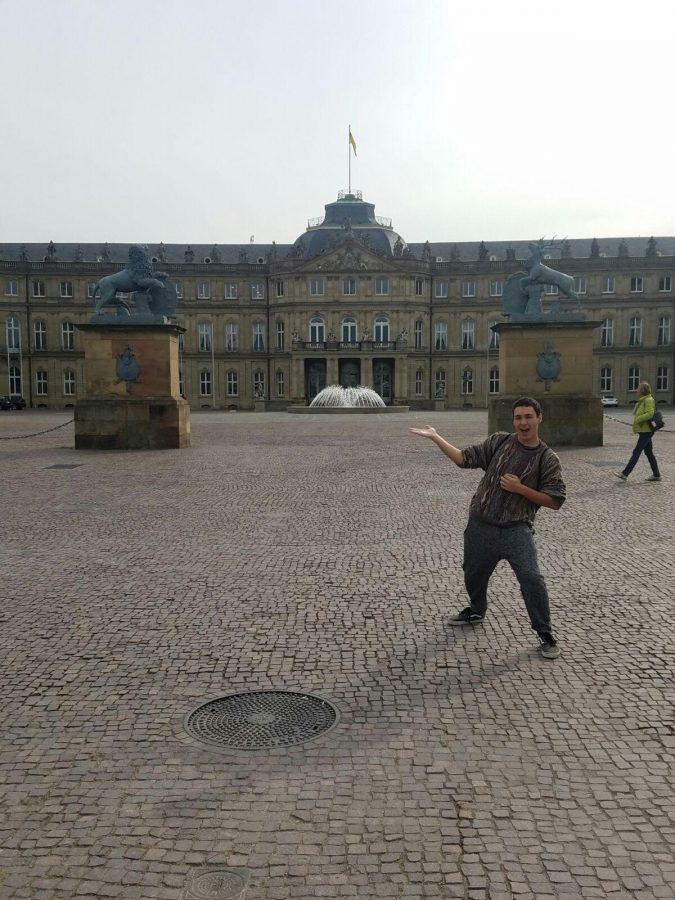Tips for potential travelers from alumnus
There comes a time in everybody’s life where they stumble upon the staggering question: What do I want to do in my life? People have to start thinking about their future, their goals, their desires.
This usually carries a lot of pressure because young people are forced to decide what they want to do for the rest of their lives, and it is very difficult to figure this out in a short amount of time when they have had so little experience with life. Most high schoolers go to college to figure out what they want to do, but nowadays it has become common for people to stray off the traditional route and follow their own.
Take VHHS alumnus Michael Nudelman: he may have not known what he wanted to do with the rest of his life, but he knew he didn’t want his future to consist of more school. That is why he has chosen the route of traveling, and not just the simple gap year or study abroad type of traveling, but the raw thing. Here is a little insight into how he got started, what his life consists of, and some of his tips for potential travelers.
Establish your true goal:
Some might call traveling a “vagabond experience.” This is when a person wanders from place to place without a set home or job. This is a great thing to do for young people fresh out of high school or college because they still have time to wander before starting developed lives. Yet, many are reluctant to do so because they’re either too scared to stray from the traditional route that is college, or they simply don’t know how to get started. If you want to lead this sort of vagabond lifestyle or are just looking to travel for a longer period of time, you just have to determine what you want out of traveling. Do some research, and go from there. Realize the difference between traveling and vacationing.
“Traveling and vacationing are two completely different things. I think the difference lies in what you’re looking for,”said Jinna Yang from The Huffington Post.
So make sure you know exactly what you are getting yourself into. Ask yourself the following questions: “Can I really be this far away from home for that long? Am I self-sufficient enough to do this? Do I want it enough?” If you answer “yes” to any of these, then you can commence with research.
“I decided to travel because I wanted to meet people that I wouldn’t have met at home and experience a way of life that is different to the way people live in Vernon Hills, Illinois. Maybe I could learn about myself and other people along the way,” said Nudelman.
Money:
Part of the reason that many people are reluctant to travel is because they are uncertain about their financial situation. Obviously this is a valid argument, but it is also important to know that traveling can be done for not as much money as one might think. Leading this vagabond style is simple and extremely life-changing if you know how to spend your money right.
A couple of general tips given by Thrillist suggests that you can do things to minimize costs by joining programs that find you a place to stay in an exchange for work, visit cheap countries and cheap places, and take a road trip so that you are on the road and aren’t too worried about nightly accommodations.
All of these ideas and others are crucial in distinguishing your financial situation from a tight one to a stable one.
Nudelman, with his experiences of spending long periods of time in New Zealand, Europe, and currently Australia, has learned a thing or two about spending money wisely. Since he commenced on all his traveling experiences at the mere age of 19, he was in the same position as most high school, and even college graduates are.
“When traveling, it’s good to buy groceries instead of eating out all the time because eating out isn’t a good way to spend a lot money. Also, the visa I got for New Zealand and Australia allows me to work here, so if I’m running low on money, I can get a job in a restaurant or on a farm. Instead of staying in a hotel or someplace more expensive, people should stay in hostels because it’s cheap accommodation and it’s a good way to meet people,” said Nudelman.
Overall just make sure you resist spending money on small, materialistic things and instead focus on the big things and how you can incorporate your money in experiences and memories.
How to get started:
All right, so you’ve got your money situation figured out. So how do you even get started? Just jump on a plane and go? Well, not exactly. There is a process, but it is not too long or lengthy if everything goes well.
“I had to do some research about [New Zealand] first because I thought maybe it would be an interesting place to check out. Then, I discovered that I had to get a visa that would allow me to work in New Zealand for up to one year. I got my visa online through the New Zealand government, and it took about a week to get approved,” said Nudelman.
From there, it is really as simple as packing light and purchasing your plane ticket. Now depending on where you may be going, the United States Department of State suggests figuring out things like laws and customs where you are traveling, if you may need to get any vaccinations, passport details, citizenship, medication, and possible insurance. Once you have done your research and have figured out what documents to bring and what to get, it is only a matter of setting the date for your departure.
Inside the traveling lifestyle:
Everyone carries expectations with themselves about most things, and traveling is one of them. Influenced by the media, online photos, movies, and our own wishes over the years, some might not fully understand what they are getting themselves into because they lack knowledge of what traveling actually consists of when it’s not part of school, program, or a family vacation. Everyone’s life is different, but there are some relatively similar things between people who travel in a similar way; most of the time, their life consists of embracing where they are. This means that the landscape is taken advantage of, as well as big cities where people find a lot of activities and things to do.
“A typical day is I wake up in the hostel, have breakfast, take a shower and grab any opportunity that comes that day. If someone were to ask me to come with them to a place or activity, then I will say yes and join them. That will probably happen a few times during the week, and it’s a good way to bond with people and make connections. If I am working, a typical week will be work and then going out or enjoying a weekend doing something. A typical week is if I’m on the move (because some times I never stay in one place for more than 2 days), there will be a period of time where I’m just experiencing new places and cities. That usually lasts about 2 months at a time until I run out of money and have to stay in a place and work,” said Nudelman.
One important aspect to be cautious about is your expectations. Though having a great time comes at a cost, you can still complete all the no-so-glamorous work like managing money and finding a job while immensely enjoying where you have decided to go. Although this might be one of the greatest experiences of your life, there can be unfavorable sides to traveling life as well.
“The best parts about traveling are that every day is an adventure so you don’t really know where you’ll end up. Also just meeting people that you normally wouldn’t meet, which is very easy to do. Exploring new places and it’s just a feeling of freedom and being out of your comfort zone and experience things are only available to you in this sort of situation is one of the best parts. It’s a spontaneous lifestyle; there’s no repetitiveness. The worst part about traveling is in hostels, people snore and sometimes they snore very loudly and being thousands of miles away from your family and friends. If you are traveling and their is a language barrier and you don’t speak the language of the country then it can be difficult to communicate and express what you want to say,”said Nudelman.
Meeting people:
Whether you’re traveling alone, with a friend, or with a group of people, it is inevitable that you will have to meet people and form connections. Plus, one of the perks of traveling is that you do get to meet people from all over the world and learn about their experiences and stories. Meeting people can be as hard or easy as you make it. If you talk to the people where you are the same way you talk to your friends back home, there essentially won’t be any issues because after all, these are people too no matter what language they speak.
“It doesn’t take much. Sometimes you just gotta say one word or one question to whoever you want to meet. A good way to start a conversation is just to ask ‘where are you from’ and you’ll be friends by the end. It is also good to join group activities from a hostel or wherever you are-just join groups of people in general. Sometimes you just have to talk to people even if you don’t like to; if you’re shy, you just gotta get out of your comfort zone because people aren’t necessarily gonna come up to you to talk, so you have to get out there and talk to some people yourself. Just be interested in what people have to say and ask why they are traveling,” said Nudelman.
Traveling if full of amazing experiences. There is a great deal of importance in surrounding yourself with culture and experiencing things outside of the classroom. There are many different modes of travel to choose from, depending on who you are and what you want. Just remember that if your mind is telling you to go somewhere, use these tips to embrace those thoughts and not suppress them.
“If you want to travel but you don’t know where to go or you’re on the fence, just go. Just pick a place and just go to try it out because you never know what will happen,” Nudelman said.
So next time you have those thoughts in your head telling you to get out of your comfort zone, don’t hesitate to act on them and you never know what might happen.

